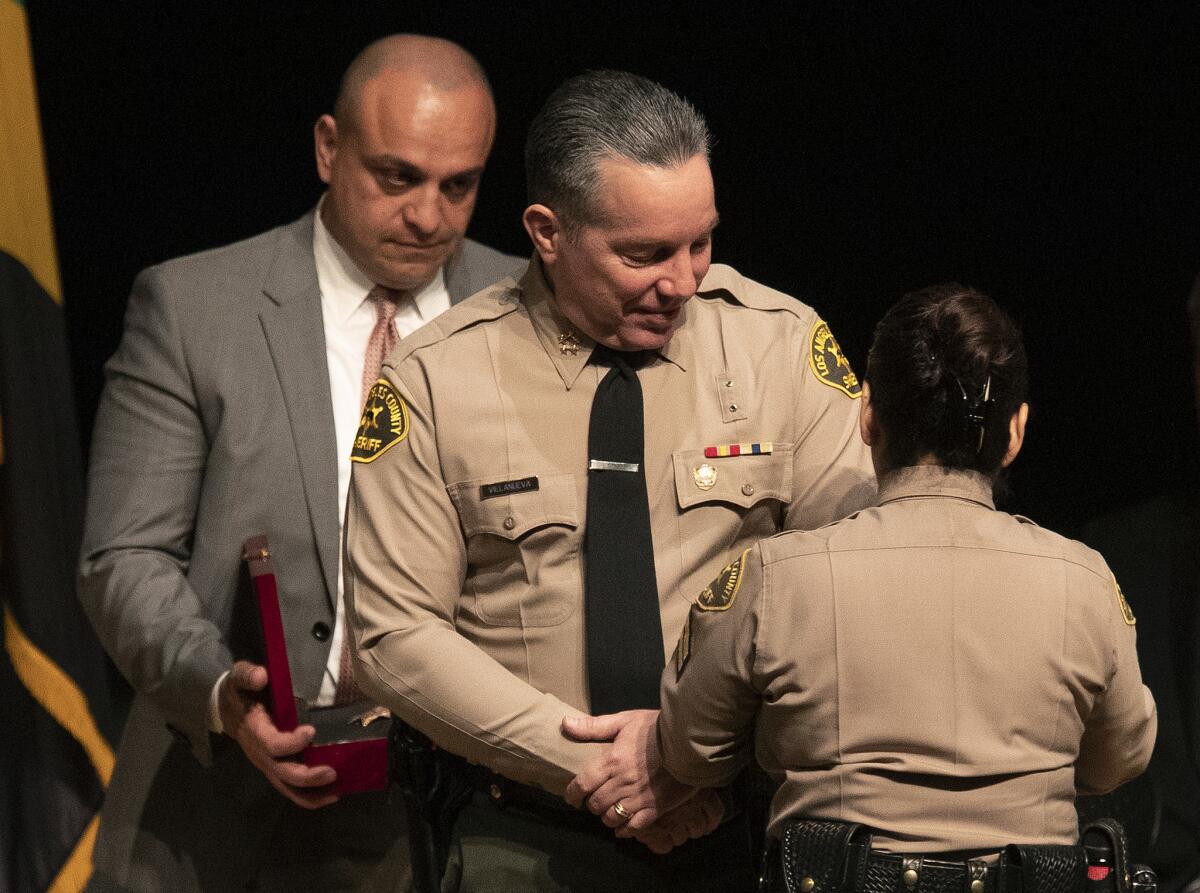Deputy reinstated by Sheriff Villanueva admitted to having tattoo linked to secret society

Investigators reviewing the case of Caren Carl Mandoyan, the Los Angeles County sheriff’s deputy fired for misconduct only to be reinstated recently by Sheriff Alex Villanueva, learned that he was a member of a secret society of deputies known as the Reapers, according to documents reviewed by The Times.
A woman who accused Mandoyan of abuse told investigators she saw the group’s tattoo on Mandoyan’s inner left ankle: a Grim Reaper holding a scythe next to the name of his Los Angeles County Sheriff’s Department station, branded with the number 98.
She said he warned her that because of his membership with the Reapers, he had influential friends who could ruin careers in the department.
Mandoyan has become the focus of an intense legal battle between the county Board of Supervisors and Villanueva, who recently reinstated Mandoyan two years after the deputy was fired in connection with the woman’s claims of domestic abuse, stalking and harassment.
The details are included in thousands of pages of documents from Mandoyan’s case obtained by The Times under a landmark police transparency law. The records include videos that showed Mandoyan attempting to break into the woman’s home, which on Thursday sparked outrage from Los Angeles County supervisors who said the sheriff should rescind the decision.
The files do not indicate that Mandoyan’s admission about the tattoo factored into his firing.
Mandoyan’s attorney, Greg Smith, said any claims his client was involved in violence are “absolute rubbish” and that the deputy hasn’t been a member of the Reapers for years. Smith has also said his client did not abuse the woman, a former deputy with whom Mandoyan was previously in a romantic relationship.
The new details of Mandoyan’s Reaper tattoo have merged two of the Sheriff’s Department’s most heated controversies: Watchdogs and members of the county’s governing board have lambasted Villanueva over reinstating Mandoyan while heightening calls to root out the agency’s subculture of tattooed deputy cliques that have long been accused of severe hazing, fights and violence against the communities they serve.
Mandoyan admitted to having a Reaper tattoo associated with the South L.A. station, according to his July 14, 2016, internal affairs interview contained in 2,000 pages of documents that were released Wednesday by the county Civil Service Commission.
The revelation comes days after Villanueva was grilled by members of the Sheriff Civilian Oversight Commission over his handling of members of tattooed deputy groups who engage in misconduct.
Villanueva told commissioners on Tuesday that he replaced the captain of the East Los Angeles station and transferred several others in response to an off-duty fight that broke out involving members of the Banditos deputy clique in September.
Earlier this month, several deputies filed a claim against the county tied to that incident, alleging harassment and beatings by some of the Banditos.
Villanueva and his newly appointed undersheriff, Tim Murakami, also said Tuesday that department officials are actively discouraging new deputies from getting station-related tattoos because of their negative associations over the years. A Times review found more than $7 million in county payouts over the last decade in lawsuits claiming excessive force by deputies known to have matching tattoos as well as to settle a case alleging harassment by an inked deputy gang.
But some watchdogs say news of Mandoyan’s association with the Reapers deepens their concerns about the department’s attitude toward secret societies and its commitment to investigating them.
“I am troubled by the fact that Mandoyan identified the fact that he has a Reaper tattoo on his ankle and seemed to make light of the fact that it is merely a station tattoo for South L.A.,” said Lael Rubin, a member of the Sheriff Civilian Oversight Commission who is part of the group’s ad hoc committee on secretive cliques.
“We all know historically, the Reapers were and are part of a subset of secret groups that have created havoc among themselves and out in the community, though that’s not to indict all of them,” said Rubin, a former prosecutor. She said the idea of Mandoyan’s tattoo “raises the specter of what his behavior was like.”
Several members of deputy cliques have said they promote morale, not violence, and that some rogue officers have maligned the purpose of the groups.
Sean Kennedy, a Loyola Law School professor and member of the oversight commission, said Mandoyan’s reported comments that being a Reaper made him influential suggest a link between deputy gang tattoos and threats of violence or other inappropriate conduct.
“How does a skull dressed as the Grim Reaper reflect high morale or pride in one’s work? The tattoos are menacing for a reason. They are meant to intimidate everybody outside the deputy gang,” Kennedy said.
The Sheriff’s Department, in conjunction with the offices of inspector general and county counsel, has been in the process of putting together a study of deputy cliques for two years. The review has still not begun because the county has not yet hired an independent contractor to conduct the probe, Elizabeth Miller of the county counsel’s office said at the oversight commission meeting Tuesday.
But when commissioners pressed Villanueva about whether he is investigating tattoos and clique affiliation among members of his own command staff, he said it would be “entirely inappropriate” to do so because it’s a private matter.
“I am wholly confident that anyone who’s in my staff right now, whether they have the tattoo or not, has not done anything to indicate there’s any type of behavior associated with it that would be detrimental to the organization or the community,” Villanueva said.
The Sheriff’s Department did not directly respond to questions about Mandoyan’s clique affiliation Thursday. A statement sent by department spokeswoman Nicole Nishida said that the Mandoyan matter will be decided in court and that the sheriff is focused on running the agency and promoting public safety.
In an application for a temporary restraining order and in statements she made to law enforcement officials, Mandoyan’s ex-girlfriend said he grabbed her by the back of her neck and squeezed it for as long as 30 seconds. She tried to hide from Mandoyan in her bathroom but he kicked in the door and broke it, she claimed.
Videos released Wednesday show Mandoyan using a metal tool to try to pry open the woman’s sliding glass door. In another instance, he is seen opening her bathroom window from the outside. The Sheriff’s Department determined Mandoyan repeatedly lied to internal affairs investigators by claiming he never tried to break into the woman’s home — statements that were contradicted by the video footage.
“I was saddened to see the video, which was a disturbing representation of what domestic violence survivors experience,” Supervisor Hilda Solis said. “In order to build trust with those who have lived through domestic violence, it is my hope that the sheriff reconsiders his decision to reinstate the deputy in question.”
Smith, Mandoyan’s attorney, said the pair lived together and that his client’s behavior on the patio was to get the woman’s attention because she locked him out of the apartment.
Mandoyan’s case has become a major issue for Villanueva since The Times revealed that the sheriff reinstated the deputy shortly after taking office. The move set off an unprecedented legal battle between the sheriff and the Board of Supervisors, which went to court to try to stop Villanueva from reinstating Mandoyan.
Mandoyan served as a volunteer on Villanueva’s election campaign, though the sheriff denies engaging in a quid pro quo with the deputy.
More to Read
Sign up for Essential California
The most important California stories and recommendations in your inbox every morning.
You may occasionally receive promotional content from the Los Angeles Times.












